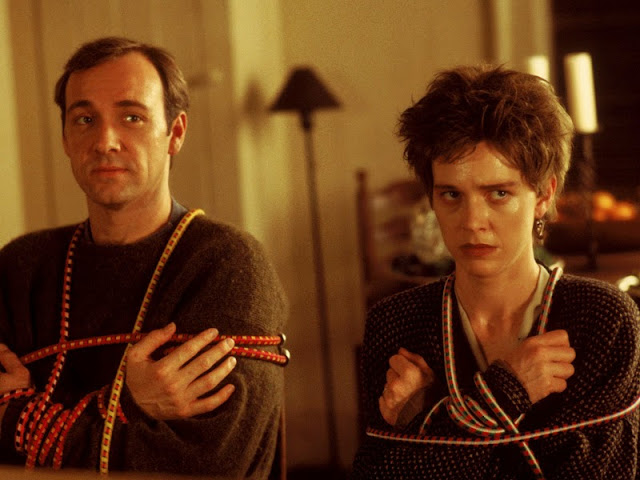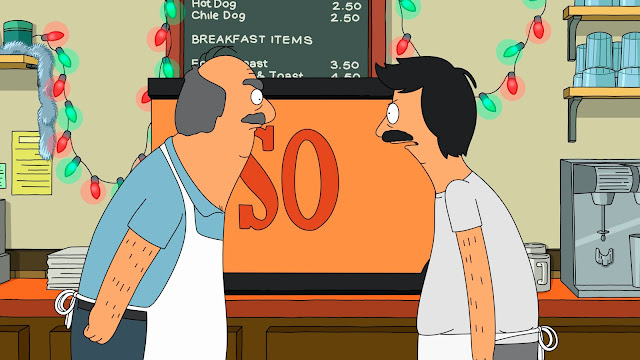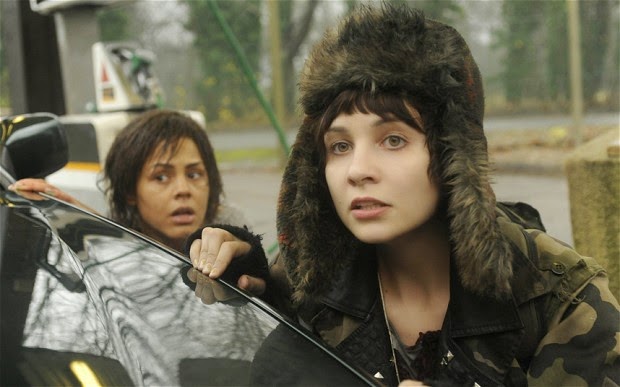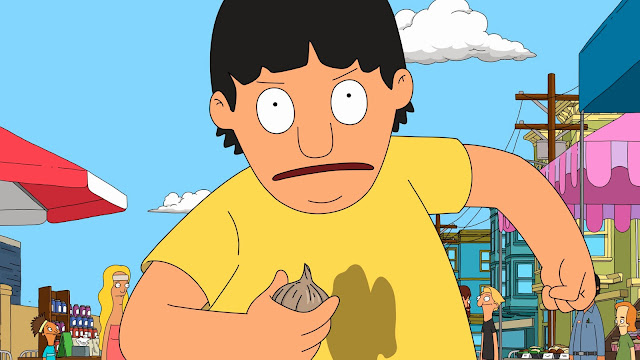Every Friday in "'Brokedown Merry-Go-Round' Show of the Week," I discuss the week's best first-run animated series episode I saw. It's time to look back at the biggest standouts of the episodes I discussed in 2014 (in chronological order). "Brokedown Merry-Go-Round," a two-hour block of original score tracks from animated shows or movies, airs weekdays at 2pm Pacific on AFOS. "'Brokedown Merry-Go-Round' Show of the Week" returns some time in January.
Rick and Morty, "Meeseeks and Destroy" (from January 24, 2014)
"Meeseeks and Destroy" is a great turning point for
Rick and Morty. It's where several of the regular characters evolve from being cartoon characters--and mere chess pawns in the writers' crazy and increasingly imaginative plots--to human beings with wants, desires, genuine sadness and occasional compassion, much like the characters on
Rick and Morty co-creator Dan Harmon's
Community.
We learn that Beth (Sarah Chalke) is having regrets about her marriage to Jerry (Chris Parnell)--being pregnant with Summer (Spencer Grammer) at a young age, while putting herself through veterinarian school, was the main reason why she wedded Jerry--and she's beginning to feel stifled by her suburban existence. As for Morty (co-creator Justin Roiland), he's getting tired of being led around by Rick (also Roiland) through such dangerous adventures on other worlds. After some persuasion from Morty and agreeing to a bet with him, the cynical grandpa, who continually warns Morty that the universe is crazy and chaotic, lets his grandson be in charge of an adventure that's closer to his perception of adventure as simple and fun (somewhere on a
Jack and the Beanstalk-like planet where medieval villagers are being subjugated by giants from a much more modernized section of the planet). That is until Morty realizes the hard way that Rick is right about the darkness and dangerousness of the universe, and his notion of adventure as simple and fun is destroyed in that unsettling scene every
Rick and Morty viewer has been
talking about on the Internet this week.
Yes, about that scene: Since
episode one,
Rick and Morty has been upfront about being dark-humored and adult, but never have I expected the show to go to such a dark place like it does when Morty is nearly raped by Mr. Jellybean, an anthropomorphic and seemingly benign jellybean, in the bathroom of a tavern inside a stairway on the giants' land. Nothing alters the mood of a comedy like sexual assault, and fortunately, unlike too many other adult animated shows, "Meeseeks and Destroy" doesn't play Morty's moments of terror and subsequent trauma for laughs.
"Edith's 50th Birthday," the infamous
All in the Family episode where Edith escapes an attempted rape in her own home, was lauded for its treatment of sexual assault (and the late Jean Stapleton totally owned the episode), but it has also dated badly. That
All in the Family episode was made at a time when all comedy on TV contained studio audience laughter or canned laughter, so you get these annoying and strange studio audience giggles during the serial rapist's attempted attack and the scenes where Edith is wracked with PTSD (I don't care for the TV version of
M*A*S*H, partly because of the canned laughter, but I always liked how the
M*A*S*H producers, who opposed the CBS execs' insistence on a laugh track, refused to add laughter
during the surgery scenes). You wonder if maybe
All in the Family would have been better off taping "Edith's 50th Birthday" without the studio audience due to the seriousness of its subject matter, but then without that live audience, you wouldn't have gotten that classic moment where the audience cheers and goes crazy when Edith smashes a burning cake into the rapist's face and escapes. The stupid laugh track is a common thing you have to put up with when rewatching all those terrible and awkward '70s and '80s
Very Special Episodes (VSEs)
All in the Family is responsible for unleashing. It served as a cushion of comfort for '70s and '80s viewers, reassuring them that this is a light comedy first and a drama second. There's no such audio of laughter to be found in "Meeseeks and Destroy," which is why I find it to be more effective about the horror of almost being sexually assaulted than "Edith's 50th Birthday."
The bathroom incident introduces a compassionate side of Rick, whose treatment of Morty has bordered on abusive, ever since he insisted to Morty in the premiere episode that he smuggle extraterrestrial plant seeds inside his butt as if he were a drug mule. Despite moments like that, we know Rick cares a bit for his grandson because he'd willingly blow up civilization if doing so would get Morty to score with the girl he's crushing on. That great moment where Rick sees Mr. Jellybean stumble out of the bathroom in bruises created by Morty, silently puts two and two together and gives Mr. Jellybean a steely-eyed stare is further proof that Rick cares for Morty, as is his hilarious final act in the medieval village immediately after he and Morty find out the identity of the villagers' king. Fuck with Rick's family, and you're eradicated from the universe, no matter what social standing you are.
I'm making it sound like the near-rape scene brings "Meeseeks and Destroy" to a screeching VSE halt. Fortunately, "Meeseeks and Destroy" doesn't awkwardly turn into a VSE after the incident or end with Rick and Morty breaking the fourth wall to give the number of a counseling hotline like so many VSEs would do (although it does end with Rick breaking the fourth wall, not for PSA reasons but to put a button on an intentionally lame one-liner with what he mistakenly thinks is an old Arsenio catchphrase). It just treats the near-rape like the unsettling and horrible thing it is, doesn't try to preach about the horribleness of it and moves on. It's a grown-up and sophisticated way of handling such a subject, compared to how the VSEs would poorly stitch together their serious subjects with bits of comic relief or reassuring messages.
And I haven't even talked yet about the brilliance of the B-story. The B-stories on
Rick and Morty have gotten increasingly ingenious, ever since the superintelligent dogs' conquest of Earth in "Lawnmower Dog." To keep Beth, Jerry and Summer from constantly turning to him for solving their problems, Rick presents them with a Meeseeks box, which, when its button is pressed, summons a Meeseeks ("I'm Mr. Meeseeks! Look at me!"), a jolly, genie-like blue creature whose purpose in life is to solve someone else's problem, and it's their only purpose because the Meeseekses wink out of existence immediately after accomplishing their tasks. Summer's Meeseeks helps her to become the most popular girl in school, while Beth's Meeseeks helps her to become a more perfect and pretty woman, as we see in an amusing restaurant scene where, over lunch, he drops some motivational advice to Beth as if he were every single
magical gay BFF in every crappy rom-com. But when relentlessly mediocre Jerry asks his Meeseeks to help him take two strokes off his golf swing, Jerry fails to fix his swing, which keeps the Meeseeks in existence longer than he expected and causes him to push the button to summon another Meeseeks to help him help Jerry. When neither of them can help Jerry, they call on more and more Meeseekses to appear until all the Meeseekses go insane and agree that the only way they can disappear is to kill Jerry.
"Existence is pain to a Meeseeks, Jerry, and we will do anything to alleviate that pain!," shouts one of the Meeseekses while holding hostage at gunpoint the customers and waiters at a restaurant where Jerry and Beth are dining. Jerry has had a rough last few episodes, from seeing his mom make out with her new and much younger lover at Christmas dinner--while his dad's bizarrely okay with it--to having what he thinks is the best sex he's ever had with Beth when he unknowingly bangs an inanimate digital clone of her. So seeing Jerry rise to the occasion for once during the hostage situation--instead of the advice of a Meeseeks, a boost of confidence from Beth is what helps him to finally perfect his swing and send all the Meeseekses away--is a nice break from his spiral of patheticness.
Jerry's triumph is also a nice break from the dark examples throughout "Meeseeks and Destroy" of why the universe is, in Rick's words, a crazy and chaotic place. Yet another dark example pops up in the post-credits tag when the village chooses to sweep Mr. Jellybean's pedophilia under the rug, which is both comedically pathetic and, as we've seen from headlines like Joe Paterno's decision to keep quiet about Jerry Sandusky, sadly all too common in this crazy and chaotic universe. The tag is one of several dark touches that have elevated
Rick and Morty from a solid Adult Swim show to one of the 2013-14 season's best new comedies, live-action or animated.
Memorable quotes:
* "Hey Rick, you got some kind of hand-shaped device that can open this mayonnaise jar?"
* Attorney: "Your Honor, I'm from a tiny person's advocacy group, and I have here in my hand a motion to dismiss! These little men were never read their giant rights and are therefore,
free fi to fo home." Rick: "What the hell is he talking about?" Attorney: "They're free to go is what I meant. I-I'm deconstructing o-our thing we say. For giants. Nobody got that? Whatever."
* "I can't take it anymore! I just want to die!" "We all want to die! We're Meeseeks!" "Why did you even rope me into this?" "'Cause he roped me into this!" "Well, him over there, he roped me into this!" "Well, he roped me into this!"
* "Jerry, maybe it's time I take that trip I always talk about." "Where would you go?" "I don't know, man. Italy, Greece, Argentina..." Jerry, doing a half-assed Carnac impression: "Countries known for their sexually aggressive men."
* "Wait. Destroy it. Our people will get more from the idea he represented than from the jellybean he actually was."
***
Rick and Morty, "Rick Potion #9" (from January 31, 2014)
The
recently renewed Rick and Morty started out as Justin Roiland's profane riff on the friendship between Doc Brown and Marty McFly in the
Back to the Future movies (and now
stage musical?!--why?!). With the addition of Dan Harmon to Roiland's vision, it's morphed into a dark--and unmistakably Adult Swim--take on the well-traveled heroes of both
The Hitchhiker's Guide to the Galaxy, which Harmon grew up reading, and
Doctor Who, which Harmon references on
Community in the form of the fictional show
Inspector Spacetime (even composer
Ryan Elder's
Rick and Morty theme tune is sort of a takeoff on Murray Gold's updated arrangement of
the old Doctor Who theme during modern
Doctor Who's first three seasons).
Modern
Doctor Who has sometimes attempted to explore what happens when the Doctor winds up making things worse rather than making them better (like what Russell T. Davies did with the 10th Doctor during the classic bottle episode "Midnight"), but on
Rick and Morty, Harmon wants to go a step further and see what it's like when you strip away the whimsy, the heroism, the ultra-competence, the pacifism and all the other comforting things that make the Doctor such a beloved part of the family-friendly half of British TV. For instance, what if Ford Prefect--who was basically a Douglas Adams clone of the Doctor--was responsible for the destruction of Earth instead of the aliens who blew it up to make way for a "hyperspace bypass" that's under construction? Or what if the Doctor was a total
sociopath and instead of saving lives and trying to avoid violence as much as possible, he didn't mind resorting to murder, which is how Rick handled an alien who attempted to molest his grandson last week in
"Meeseeks and Destroy"?
This week, in "Rick Potion #9," which is credited solely to Roiland,
Rick and Morty does an inspired--and thanks to all the David Cronenbergian body horror imagery, delightfully grotesque--spin on "What if the Doctor's scientific expertise kept ruining everything and plunged Earth into an apocalypse?" I love how the apocalypse is the result of an experimental love potion that was lying around Rick's lab like some unread indie comic I bought at APE in Sucka Free about a half a decade ago but have never gotten around to flipping through and is gathering more dust than a "Which racial terms are not allowed to be said on the air?" manual at the offices of Fox News.
Morty uses the potion to get Jessica, the classmate whose
breasteses he dreamt about caressing in
the pilot, to fall for him at their school's Flu Season Dance. But of course, the potion, which Rick warns Morty not to use on her if she has the flu, goes wrong when it's combined with Jessica's flu microbes and it ends up infecting everyone else at the dance. So in addition to both female and male classmates wanting Morty's body, all the faculty members become infatuated with Morty as well. Soon the rest of the world follows suit, except for Morty's loved ones, who are immune to the effects of Rick's potion because Rick's not much of a fan of incest, whether it takes place inside Morty's math teacher's pervy dream world or at
9pm on Sundays on
HBO.
Each of Rick's attempts to undo the potion's effects results in the rest of Earth's population experiencing different stages of mutations, one more horrible than the next. Rick's Cronenberging of the world gets so bad that he starts referring to all the mutated humans as "Cronenbergs." Only when the world's in complete shambles does a loser like Morty's dad Jerry get his chance to step up and take charge, and while he and his wife Beth's transformations into trigger-happy, post-apocalyptic action heroes are full of badass lines delivered with Ash from
Evil Dead II-style aplomb by Chris Parnell and Sarah Chalke, it feels a little repetitive coming right after Jerry's victory with his revamped golf swing in "Meeseeks and Destroy."
"Rick Potion #9" was actually the first episode (after the pilot) that Harmon, Roiland and the other voice actors worked on, but Harmon and Roiland pushed it back to halfway through the first season because they felt it made more sense to air it at this later point. So while the change in air order results in a character who was previously established as an eternal fuck-up turning into a winner two episodes in a row, the decision to delay "Rick Potion #9" also makes the episode's downbeat final scene--soundtracked to the funereal strains of Mazzy Star's "Look on Down from the Bridge," a song that was also used on
The Sopranos--much more powerful.
Rick's ultimate solution to all his previous mistakes is the kind of
deus ex machina I don't think I've ever seen before in sci-fi, and it's another example of how brilliantly plotted
Rick and Morty has been each week. With his portal gun, Rick simply abandons the monster-infested Earth he's inadvertently created and takes Morty with him to an alternate--and completely identical--Earth where they can start anew and replace that Earth's Rick and Morty, who died in a lab experiment without either Beth, Jerry or Summer to see them perish. Rick uses his portal technology to pinpoint the exact moment when their alternate counterparts died so that he and Morty can immediately bury their counterparts' corpses and take over their identities without Beth, Jerry and Summer noticing.
The act of burying his own horribly mangled corpse in the soil does such a number on Morty's psyche that all Morty can do afterward is sit silently in a shocked daze, not to mention the fact that he's surrounded by a family that looks and behaves exactly like the one he's spent all his life with (alt-Beth and alt-Jerry argue just like Beth and Jerry do; alt-Summer is glued to her phone just like Summer), but it isn't the same one he's spent all his life with. Meanwhile, Rick, with booze in hand, of course, nonchalantly eases his way into this alt-Earth as if he's done it a million times before. In one of the most memorable lines in
GoldenEye, the Sean Bean character attempts to cut 007 down to size by telling him that he knocks back martinis to silence the screams of the men he's killed. I wouldn't be surprised if the booze similarly helps Rick to dull the remorse that Morty is now feeling and that I imagine a younger Rick must have felt too when he first encountered crazy situations like this.
This eerie and dramatic conclusion to a comedically chaotic episode would have felt heavy-handed had Adult Swim aired "Rick Potion #9" right after the pilot. But reshuffling the episode order--so that "Rick Potion #9" takes place after the
Inception-esque mind-fuckery in both "Lawnmower Dog" and "M. Night Shyam-Aliens!,"
Morty's disgust over killing his loved ones' demonically possessed alternate reality clones and his near-brush with sexual assault inside that men's room--makes Morty's concluding expression of both despair and exhaustion resonate more. Because
Rick and Morty isn't a serialized comedy, I wouldn't be surprised if the show never addresses the change in universes again and presses on as if nothing drastic happened. But that look of despair raises a bunch of questions about the rest of the season. Is Morty starting to wish for a life away from Rick? Does Rick even care about the destruction he leaves behind wherever he goes? Could he be an even bigger monster than the Cronenbergs he created back in the old universe?
By its second season,
The Venture Bros. grew from being a
Jonny Quest parody to something much richer. With the one-two punch of "Meeseeks and Destroy" and now "Rick Potion #9,"
Rick and Morty is already showing signs of doing the same thing: outgrowing its
Doctor Who parody trappings to become its own animal, a lot more ferocious--and frequently funnier--than the classic that inspired it.
Memorable quotes:
* "The Flu Season Dance is about awareness, not celebration. You don't bring dead babies to Passover."
* "We interrupt
Pregnant Baby with breaking news!"
* When Morty accuses Rick of being way more irresponsible than him, Rick's dismissal of love potions as being nothing more than roofies is so damn terrific: "All I wanted you to do was hand me a screwdriver, Morty. You're the one who wanted to me... wanted me to... buckle down and make you up a... roofie juice serum so you could roofie that poor girl at your school. I mean, w-w-w-w-w-a-are you kidding me, Morty? You're gonna try to take the high road on this one? Y-y-you're a little creep, Morty. Y-y-you're-you're just a little creepy creep person."
* And now, some pre-makeout banter that would never be uttered on
Doctor Who: "I wish that shotgun was my penis." "If it were, you could call me Ernest Hemingway." "I don't get it, and I don't need to."
***
Space Dandy, "Plants Are Living Things Too, Baby" (from March 7, 2014)
In the preview for this week's
Space Dandy episode that followed last week's episode, Dr. Gel (Unshou Ishizuka), the gorilla scientist from the Gogol Empire who's obsessed with capturing the titular alien hunter, complained off-screen about having to die at the end of every story and wasn't too thrilled to learn from his assistant Bea (Kosuke Hatakeyama) that he wouldn't appear at all in the next one. During "Plants Are Living Things Too, Baby," I didn't miss Dr. Gel at all.
Easily the most visually stunning
Space Dandy episode so far, "Plants Are Living Things Too, Baby" proves once again that where
Space Dandy excels is not in its slapstick or its running gags like Dr. Gel's incompetence as a villain (Dandy never notices his presence, and if
the parallel universes theory regarding
Space Dandy's self-contained continuity each week is true, neither do Dandy's parallel counterparts). The blundering villain who's continually unable to catch or kill the person he hates the most is a gag that's been done before, and with much funnier and cleverer results in shows like
The Venture Bros. Where
Space Dandy excels the most is in its willingness to experiment each week, either story-wise or visually, like general director Shinichiro Watanabe's previous shows
Cowboy Bebop and
Samurai Champloo often did. As
I've said before,
Space Dandy has the feel of an anthology, with the only constant being Dandy, QT the robot, Meow and their ship, and with a different animator taking a stab at directing each week (not to mention a different artist being assigned to design each alien world that's visited by the
Aloha Oe crew).
Those of the show's haters who wrote off
Space Dandy right after its premiere (because of either the fan service during the Boobies breastaurant scene or the mostly forced attempts at humor in that first episode) are missing out on some intriguing excursions into different sci-fi subgenres, whether it's the space race genre
a la Redline or zombie comedy. They're also missing out on some just plain good short story writing, like in last week's uneven but enjoyable "The Lonely Pooch Planet, Baby"--which came up with a nifty explanation for the whereabouts of
Laika, the ill-fated dog inside
Sputnik 2 during its 1957 orbit around Earth--and in this week's episode, the first one Watanabe has written since the premiere.
































